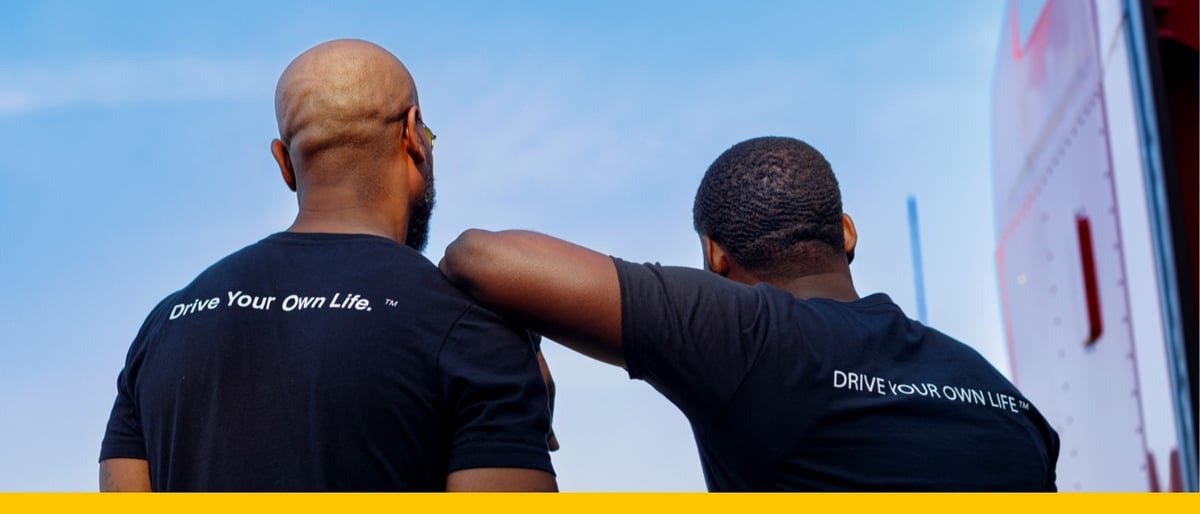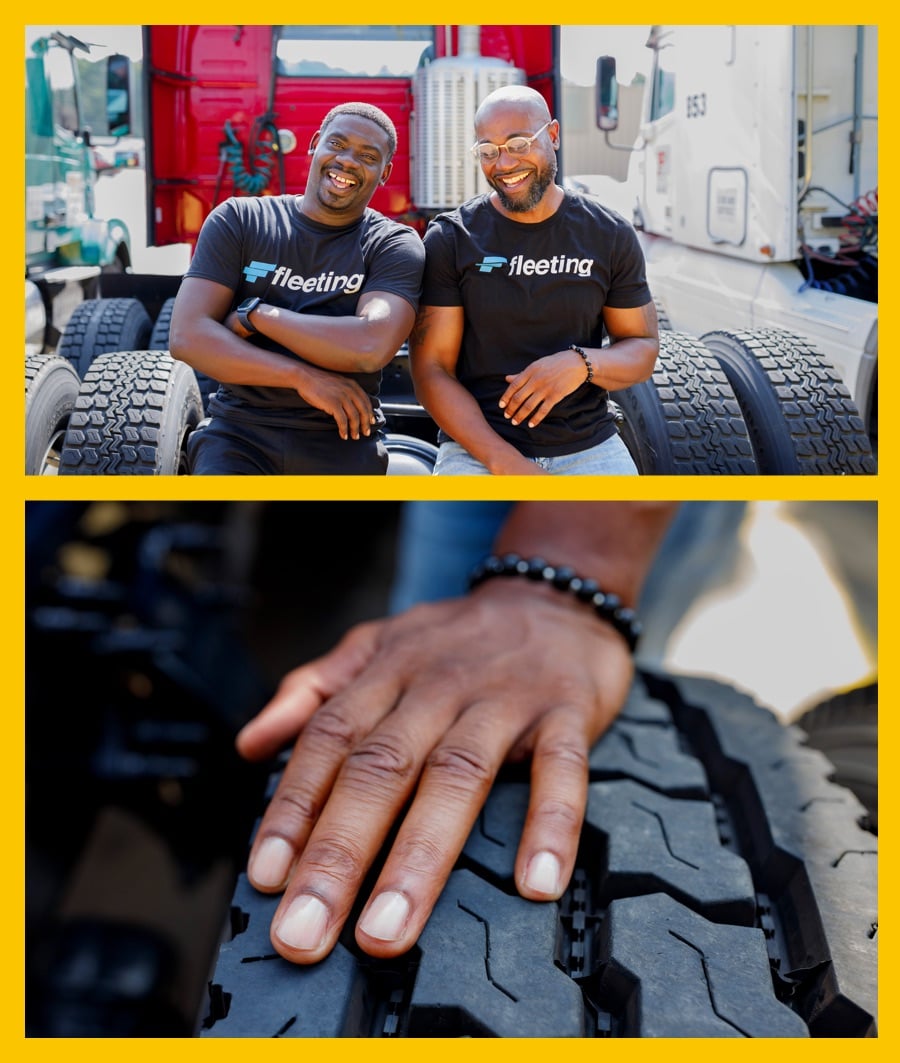
Finding Diverse Talent Off the Beaten Path
Pierre Laguerre (right), is addressing a driver shortage in his company, Fleeting, by training former inmates to get commercial driver's licenses. Longtime friend Terrell Hall (left), now runs the training program.
• Small businesses can use “open hiring” to target workers with needed “middle skills”.
• Tech can be an equalizer in recruiting, but be mindful of unconscious biases.
• Larger enterprises like Synchrony can provide examples of how to hire from non-traditional talent pools.
When Tiffini Gatlin, CEO of Atlanta’s Latched & Hooked Beauty, needed a new employee to help with warehouse fulfillment, she turned to her longtime church. Gatlin’s six-person company sells synthetic hair to women and stylists, and her congregation, Cascade United Methodist Church, has a legacy of social justice involvement and often helps members identify job opportunities. “People are always going to the church for help when they’re looking for employment,” she says. Indeed, her most recent hire came from Cascade—a 55-year-old woman who had struggled to find employment elsewhere.
There’s lots of diverse talent, ethnically as well as diverse in education, skills and background, in Atlanta, where 51% of the population identifies as Black and nearly 48% of its adult workforce has a bachelor’s degree or higher. But with large companies like Airbnb and Microsoft expanding their presence in Atlanta and tapping into its workforce, smaller companies are under greater pressure to compete for that talent, and to hold onto them once hired.
A confluence of factors is bringing a heightened imperative for diversity in hiring into fuller view, even for small businesses. Companies are hiring at a rapid clip as the economy steams ahead post-pandemic. Job candidates are more aware of their leverage in a tight labor market, and are choosing workplaces that reflect their values, including diversity. And employers are using technology to broaden their talent pools and lower recruiting costs.
The result is that businesses now have greater tools and incentives to diversify their workforces, if they have the will to do so.
“Small businesses no longer have the excuse of saying they can’t find diverse candidates, because it’s too easy to recruit,” in an era where technology allows them to locate candidates anywhere, says Keith Hollingsworth, a professor of business administration at Morehouse College in Atlanta. “But they still have a responsibility to make sure to check unconscious biases so that they don’t unintentionally filter out people.”
Hollingsworth describes how that might play out in a city like Atlanta, which is rich with talent but not immune to bias in hiring. Morehouse, where he has taught for 28 years, is one of Atlanta’s four historically black colleges and universities, or HBCUs, which produce hundreds of new graduates each year. Nearby Georgia State University, “graduates more Black people than the HBCUs combined,” he added.
Yet that hasn’t kept bias out of recruiting.
“I’ve had a prominent consulting firm turn down my valedictorian and tell me my student hasn’t been trained in case studies,” Hollingsworth says. “The same company said they go to Ivy League schools and hire history majors who definitely haven’t had that training. Well, maybe your recruiter hasn’t been trained to look beyond their biases. That’s what people have to get over.”
Hollingsworth suggests that companies who want more diverse teams can work toward that goal using technology. For example, since it’s cheaper to screen new grads using tools like Zoom than to visit campuses, recruiters can explore broader talent pools for less money than in the past, he says.
But companies hiring for positions that require four-year degrees aren’t the only ones now pressed for diverse hires.
“Businesses can’t find staff right now, so there’s a shift away from needing a college degree and toward getting rid of a lot of the old barriers to employment,” says Dr. Penny Jennings, Vice President of Strategic Programs at the Greyston Center for Open Hiring.
This means that, for some companies, old litmus tests like checking applicants’ credit scores and screening for past convictions are taking a backseat to finding enthusiastic candidates who may lack experience or need support with things like childcare or transportation. It also means turning over different stones. Jennings says many businesses are locating workers through faith-based organizations and local vocational training programs and working with people exiting the criminal justice system to find those with what she calls “middle skills,” which don’t require degrees but do require some occupational training. Turning to these non-traditional types of hiring sources provides a broader sense of diversity.
“They’re looking for things like coding or people who can be trained for a commercial driver’s license. That is a middle-skilled job, but it affords an individual the opportunity to earn a family-sustaining wage,” she says.
Tephra Miriam, a local consultant who advises companies on diversity and inclusion strategies, says small businesses are forced to be nimble and flexible about recruiting, which often means plumbing pools of candidates that their larger competitors might overlook. “They don't have big recruiting departments that can be spread out between all of these different events. It becomes a little bit harder for small businesses to create diverse pipelines,” she says.
There’s also been a shift in attitudes about who is employable. At least 14 states have passed so-called Ban the Box laws, which eliminate barriers to employment for the formerly incarcerated by forbidding employers from asking about criminal history on job applications. Georgia became the first Southern state to pass such a law, in 2015. Jennings says there’s been a big uptick in calls from employers about the “open hiring” approach her organization extols, which essentially involves eliminating applications and interview questions that don’t squarely relate to the position.
“There are people who want to be in the workforce, but if they’ve had problems in the past and you ask them about their credit history, you stand to lose a good employee and they lose an opportunity,” she says.
Pierre Laguerre, founder and CEO of Fleeting, a commercial fleet management and services company, created a program to help incarcerated applicants prepare to obtain commercial driver’s licenses and apply for positions once they’re released from prison. Since trucking is an industry suffering from a driver shortage, opening the doors to this non-traditional source makes sense for Laguerre, who relocated Fleeting to Atlanta from New York last year. “These trucks won’t drive themselves. We need people,” he says.
To run the program, Laguerre hired Terrell Hall, his lifelong friend who was previously incarcerated. Hall, who was released in 2015, says that since then, he’s wanted what many other formerly incarcerated individuals do: a clean start. Hall has provided Fleeting a diverse and new perspective that other employees might not have.

“Employment represents more than living wages,” he says. “Employment helps a person build a sense of stability and belonging. Lack of employment is the number-one cause of recidivism.”
The national labor shortage hitting Fleeting has ratcheted up competition for workers, regardless of company size or industry. The Bureau of Labor Statistics reported a record 9.3 million available jobs in April 2021; the following month, that number hovered at 9.2 million. To address the gap, a number of organizations have formed in recent years to help small businesses and startups find ways to connect with workers.
That’s given businesses an imperative to boost their recruiting. At some large companies like Synchrony, there’s been a renewed emphasis on tapping into internal employee resource groups, which focus on underrepresented groups like women, LGBTQ+ or Black employees.
Synchrony relies on eight internal Diversity Networks to help the company identify and recruit a broad range of talent. To bolster those efforts, Synchrony in 2020 launched a new initiative called Advancing Diverse Talent, in which it uses data and analytics to help identify gaps in hiring, retention and promotion.
This year, the company joined the OneTen Coalition, a coalition of current and former executives and companies committed to “train, hire and advance one million Black individuals into family-sustaining American jobs over the next decade.” Echoing the Greystone Center’s focus, Synchrony’s commitment includes advancing Black talent who have high-school diplomas into middle-skill jobs.
Atlanta-based Goodie Nation was founded in 2012 to address the “relationship gap” between tech-focused social entrepreneurs and personnel. In recent years, the organization has seen how a company’s size and resources are tied to the kinds of relationships it needs to attract talent.
“What we’ve discovered is the lack of financial capital is really a subset of a lack of social capital or relationship capital,” says Joey Womack, Goodie Nation’s founder. “In Atlanta, a key driver of success is how many connections an entrepreneur has to graduates at [colleges] like Emory, Georgia Tech and so forth.”
Without those connections, leveraging young talent from outside of the collegiate network can level the playing field. “As [students are] graduating from high school and looking at the student loan debt, many of these individuals will not be looking to go to college,” he says, noting that potential Gen Z employees might be attracted to small companies that don’t require a degree, while business owners might be interested in utilizing the inherent digital skills of these candidates.
Womack says that company culture is key to attracting younger talent, which could give small businesses that are quicker to adapt a competitive advantage. Recent grads know that remote work is possible, for example, so companies that allow for flexible work locations might have a leg up in hiring.
Meanwhile, Gatlin’s company prioritizes ethnic and gender diversity -- focusing on women of color in its hiring practices through outreach to connections at her alma mater, Clark Atlanta University.
“When I find a good employee, my job is to make sure that person is well-trained so they can use those skills in my company, and eventually transfer them to another place.”
No matter where businesses look for employees, Jennings says successful companies have to get more adept at flexible hiring and looking within new candidate pools.
“Employers are coming around. They’re opening the door to individuals they would never have considered before.”
Learn more:
• Networking to Discover New Hires (Reflik)
• Businesses Benefit from Hiring Employees with Disabilities (Atlanta Business Chronicle)
• How to Hire More Black Women (Financial Times)
All content on the Synchrony hub on Bloomberg.com is sponsored content. The content is not Bloomberg editorial content and does not necessarily reflect the views of Bloomberg L.P., its affiliates or owner and does not reflect any direct or indirect endorsement of Synchrony, its affiliates or clients. This content is subject to change without notice and offered for informational use only. You are urged to consult with your individual business, financial, legal, tax and/or other advisors with respect to any information presented. All statements and opinions in this content are the sole opinions of the interviewees.
